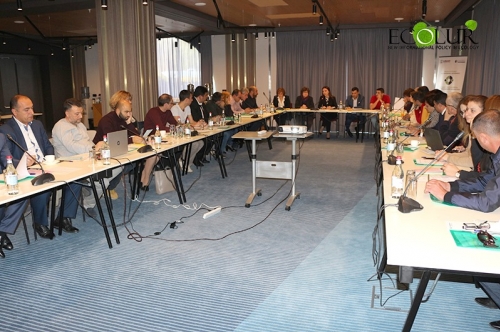

EcoLur
On October 29, a direct dialogue was held in Yerevan with all stakeholders in the mining sector to increase transparency and accountability in the sector. The residents of the affected areas by "Zangezur Copper and Molybdenum Combine" CJSC, "Agarak Copper and Molybdenum Combine" CJSC ("GeoProMining"), "Teghout" CJSC/"VTB-Armenia" Bank, "GeoProMining Gold" LLC, “Akhtala Ore Processing Combine” CJSC, “Chaarat Kapan” CJSC raised their questions on the following topics:
I. Implementation of RA Law on Expedient Use of Environmental Taxes Payable by Companies Due to Enlargement of Metal Mining Communities. Issues related to the selection of beneficiaries of environmental and health programs as a result of enlargement of affected communities.
II. Compatibility of projects implemented with the funds allocated by mining corporations' social responsibility to community needs.
Lilia Shushanyan, Deputy Minister of Territorial Administration and Infrastructures of the Republic of Armenia, representatives of the Ministry of Environment, the civil society members of the Extractive Industries Transparency Initiative (EITI), of Qajaran, community heads of Kapan, Meghri, Akhtala, Shnogh, and Geghamasar and civil society representatives presented their approaches.

It was decided to discuss the issues raised during the discussion and submit recommendations to the EITI MSG for further work.


During the event, the presentation of "Who Our Soil WEALTH Serves" film was made shot by EcoLur. The purpose of the film is to make the issues raised by residents of Qajaran, Kapan, Meghri, Akhtala, Shnogh, Geghamar and Ararat and mining communities heard, which may be assisted with the EITI process in Armenia.
Discussion details will be available in the next posts.
This material has been prepared within “Mining-Impacted Communities – Full Participants in EITI Process'” project implemented by EcoLur with the USAID support within the frames of “Engaged Citizenry for Responsible Governance” project implemented by Transparency International Anticorruption Center.

This article is made possible by the generous support of the American People through the United States Agency for International Development (USAID). The contents of this article are the sole responsibility of the authors and do not necessarily reflect the views of USAID or the United States Government.
October 30, 2019 at 20:00
